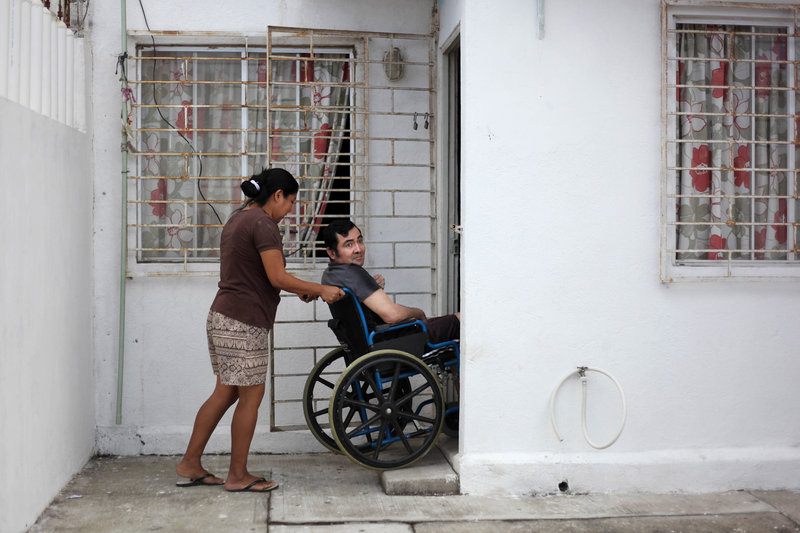DES MOINES, Iowa – Days after they were badly hurt in a car accident, Jacinto Cruz and Jose Rodriguez-Saldana lay unconscious in an Iowa hospital while the American health care system weighed what to do with the two immigrants from Mexico.
The men had health insurance from jobs at one of the nation’s largest pork producers. But neither had legal permission to live in the U.S., nor was it clear whether their insurance would pay for the long-term rehabilitation they needed.
So Iowa Methodist Medical Center in Des Moines took matters into its own hands: After consulting with the patients’ families, it quietly loaded the two comatose men onto a private jet that flew them back to Mexico, effectively deporting them without consulting any court or federal agency.
When the men awoke, they were more than 1,800 miles away in a hospital in Veracruz, on the Mexican Gulf Coast.
Hundreds of immigrants who are in the U.S. illegally have taken similar journeys through a little-known removal system run not by the federal government trying to enforce laws but by hospitals seeking to curb high costs. A recent report compiled by immigrant advocacy groups made a rare attempt to determine how many people are sent home, concluding that at least 600 immigrants were removed over a five-year period, though there were likely many more.
In interviews with immigrants, their families, attorneys and advocates, The Associated Press reviewed the obscure process known formally as “medical repatriation,” which allows hospitals to put patients on chartered international flights, often while they are still unconscious. Hospitals typically pay for the flights.
“The problem is it’s all taking place in this unregulated sort of a black hole … and there is no tracking,” said law professor Lori Nessel, director of the Center for Social Justice at Seton Hall Law School, which offers free legal representation to immigrants.
Now advocates for immigrants are concerned that hospitals could soon begin expanding the practice after full implementation of federal health care reform, which will make deep cuts to the payments hospitals receive for taking care of the uninsured.
Health care executives say they are caught between a requirement to accept all patients and a political battle over immigration.
“It really is a Catch-22 for us,” said Dr. Mark Purtle, vice president of Medical Affairs for Iowa Health System, which includes Iowa Methodist Medical Center. “This is the area that the federal government, the state, everybody says we’re not paying for the undocumented.”
Hospitals are legally mandated to care for all patients who need emergency treatment, regardless of citizenship status or ability to pay. But once a patient is stabilized, that funding ceases, along with the requirement to provide care. Many immigrant workers without citizenship are ineligible for Medicaid, the government’s insurance program for the poor and elderly.
That’s why hospitals often try to send those patients to rehabilitation centers and nursing homes back in their home countries.
Civil rights groups say the practice violates U.S. and international laws and unfairly targets one of the nation’s most defenseless populations.
“They don’t have advocates, and they don’t have people who will speak on their behalf,” said Miami attorney John De Leon, who has been arguing such cases for a decade.
The two Mexican workers in Iowa came to the U.S. in search of better jobs and found work at Iowa Select Farms, which provided them with medical insurance even though they had no visas or other immigration documents.
An Iowa Select Farms spokeswoman said Tuesday she could find no record that the men worked for the company under those names. The attorney for the two men said he learned through subpoenas that they had worked for a pork company that he believes was once a subsidiary of Iowa Select.
The two were returning home from a fishing trip in May 2008 when their car was struck by a semitrailer truck. Both were thrown from the vehicle and suffered serious head injuries.
At the time, Cruz had been here for about six months, Rodriguez-Saldana for a little over a year.
Insurance paid more than $100,000 for the two men’s emergency treatment. But it was unclear whether the policies would pay for long-term rehabilitation. Two rehabilitation centers refused to take them.
Eleven days after the car crash, the two men were still comatose as they were carried aboard a jet bound for Veracruz, where a hospital had agreed to take them.
Rodriguez-Saldana, now 39, said the Des Moines hospital told his family that he was unlikely to survive and should be sent home.
The hospital “doesn’t really want Mexicans,” he said in a telephone interview with the AP. “They wanted to disconnect me so I could die. They said I couldn’t survive, that I wouldn’t live.”
Patients are frequently told family members want them to come home. In cases where the patient is unconscious or can’t communicate, relatives are told their loved one wants to return, De Leon said.
Sometimes they’re told the situation is dire, and the patient may die, prompting many grief-stricken relatives to agree to a transfer, he said.
Some hospitals “emotionally extort family members in their home country,” De Leon said. “They make family members back home feel guilty so they can simply put them on a plane and drop them off at the airport.”
Send questions/comments to the editors.



Success. Please wait for the page to reload. If the page does not reload within 5 seconds, please refresh the page.
Enter your email and password to access comments.
Hi, to comment on stories you must . This profile is in addition to your subscription and website login.
Already have a commenting profile? .
Invalid username/password.
Please check your email to confirm and complete your registration.
Only subscribers are eligible to post comments. Please subscribe or login first for digital access. Here’s why.
Use the form below to reset your password. When you've submitted your account email, we will send an email with a reset code.